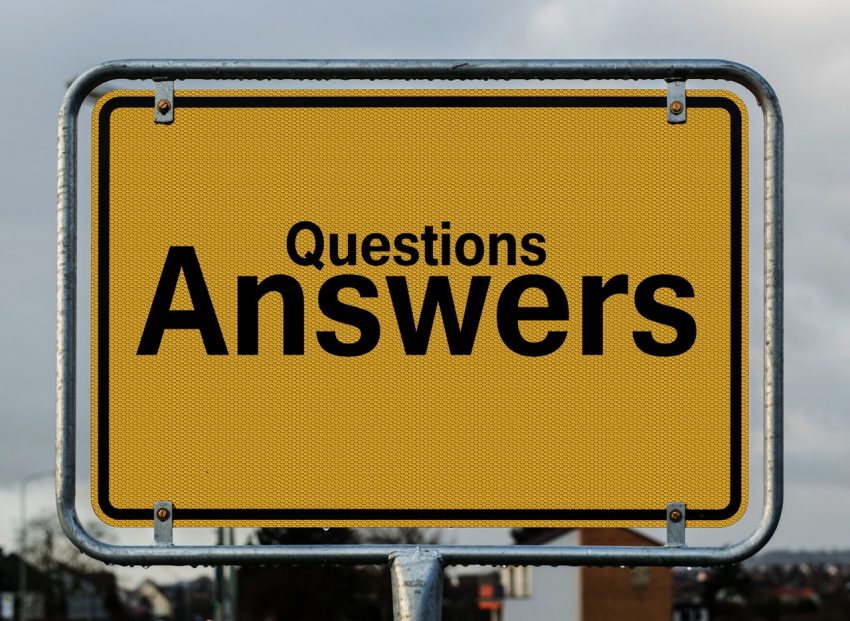Asking Questions in French – Our Complete Guide

Asking questions in French proving to be tricky? There’s no need for them to be! We’ve come up with five easy ways of asking questions in French that will totally boost your conversational skills. Have a read of our guide to find out more!
Want to ask questions in French but don’t know how to go about it? You’re in the right place!
Method 1: The EST-CE QUE method
Add est-ce que at the beginning of any statement to turn it into a question. In English, the direct translation of Est-ce que is “is it that.”
For example:
Il est arrivé. (He arrived) -> Est-ce qu’il est arrivé? (Has he arrived?)
Tu connais John. (You know John) -> Est-ce que tu connais John? (Do you know John?)
Method 2: Statement into a question
One of the easiest methods of asking questions in French is simply by turning a statement into a question. In spoken situations, all you need to do in this case is change your intonation so that it sounds like you are asking a question. If it’s in writing, add a question mark at the end. Simple!
For example:
Il est parti. (He’s gone) -> Il est parti? (Has he gone?)
Tu aimes lire. (You like reading) -> Tu aimes lire? (Do you like reading?)
Method 3: Using N’est-ce-pas or non:
When you’re sure that the person you are speaking to will agree with what you’re saying, use n’est-ce pas at the end of your sentence. It’s the same as adding “isn’t it?” or “right?” after asking a question in English.
Similarly, ‘non‘ and ‘hein?‘ are also used to form questions in French . While non means “no” and can be placed at the end of a sentence,hein? is used in the same way as “eh?” in English.
Let’s look at some examples:
Vous aimez les bonbons, n’est-ce pas? (You like candy, don’t you?)
Elle est arrivée, n’est-ce pas? (She arrived, didn’t she?)
Vous aimez les bonbons, non? (You like candy, right?)
Vous aimez les bonbons, hein? (You like candy, eh?)
Method 4: Using interrogative words
One method of asking questions in French is using interrogative words. These can be used at the beginning of a sentence or at the end. They can also be placed either before est-ce que or before the inverted verb and the subject. Here are some examples:
“When did you arrive?” can be asked in various ways in French:
Quand est-ce que tu es arrivé?
Quand es-tu arrivé?
Quand t’es arrivé?
T’es arrivé quand?
Here are some of the most common interrogative words used in French:
Combien
Combien means “how many” or “how much”.
When combien is followed by a noun, you have to add the preposition ‘de’ (of) after it.
For example:
Combien de fruits allez-vous manger? (How many fruits are you going to eat?)
Combien de calories brûlez-vous en une journée? (How many calories do you burn in a day?)
Pourquoi?
Pourquoi? means “why?”.
For example:
Pourquoi partez-vous tôt? (Why are you leaving early?)
Comment?
Comment generally means “how” but it can sometimes mean “what”. For instance:
Comment le sais-tu? (How do you know?)
Comment? (What?)
Quand?
Quand means “when”
Example:
Quand est-ce que tu rentres à la maison? (When are you going home?)
Quand est-ce arrivé? (When did it happen?)
Qui? Que? and Quoi?
Talk about confusing!
Qui, Que, and Quoi mean “Who” and “What”. They can be used when referring to a person, a thing, a designated subject, an object, or as a preposition.Que and quoi are used when you are talking about something and generally mean “what”. The only difference between them is that only quoi is used following a preposition.
You’ll see Qui being used in many different situations. It’s the French equivalent to “who” (subject) or “whom” (object), and used when talking about living beings.
Similarly, À qui means “whose”. For example: Àqui est cette robe? (Whose is this dress?)
Take a look at the table below to see more ways in which qui is used:
Method 4: QUI
Who?
Whom?Referring to
peopleMeaning Examples Meaning
Subject Qui?
Qui est-ce qui?Who? Qui vient?
Qui est-ce qui
vient?Who's
coming?
Object Qui?
Qui est-ce que?Who?
Whom?Qui vois-tu?
Qui est-ce que tu
vois?Who/Whom
can you see?
After
PrepositionQui?
Qui est-ce que?Who?
Whom?De qui est ce
qu'il parle?
Pour qui est ce
livre?
À qui avez-vous
écrit?Who's he
talking about?
Who's this
book for?
Who did you
write
to?
To whom
did
you write?
The video below is a great way to see how else you can ask questions in French
Quel, quels, quelle, or quelles?
Quel can either mean “who?”, “what?” or “which?”. You can use it with a noun or a pronoun.
Here are other forms of quel:
- Quel (masculine singular)
- Quels (masculine plural)
- Quelle (feminine singular)
- Quelles (feminine plural)
Examples:
Qui est ton poète préféré? (Who’s your favorite poet?)
Quel club recommandes-tu? (Which club do you recommend?)
Que portez-vous? (What are you wearing?)
Lequel? laquelle? lesquels? and lesquelles?
Lequel corresponds to “which one?”
Here are its other forms:
- Lequel (masculine singular) which one?
- Lequels (masculine plural) which one?
- Laquelle (feminine singular) which ones?
- Lesquelles (feminine plural) which ones?
Example:
Laquelle de ces valises est à Fred?(Which of these suitcases is Fred’s?)
Method 5: Forming questions by changing the order of words
Inverting or changing the sentence structure is one of the fanciest ways of forming a question in French. Think of it as more of a formal method of asking questions.
Simply place the verb before the subject and build your question from there. For instance:
Tu aimes lire – You like reading
(Here, the subject precedes the verb)
Do you like reading? – Aimes-tu lire?
(Here, the position of the verb and subject is interchanged and linked by a hyphen).
In sentences where compound tenses are used, the conjugated form of être or avoir is moved to before the pronoun.
For example:
As-tu déjeuné mon déjeuner? – Have you eaten my lunch?
Est-ce qu’elle s’est endormie? – Did she fall asleep?
In this form, you’ll see that a ” -t- ” is always placed the pronouns elle or il and the verb, but only when this verb ends with a vowel.
For instance:
Does she love the cat? – Aime-t-elle le chat?
And that brings our lesson to an end!
Why not try our quiz below to put what you’ve learnt today to the test?
See you next lesson – and in the meantime, don’t forget to practice! If you need any help don’t hesitate to get into contact with one of our online French tutors.
Quiz: Test your knowledge of French Questions!



